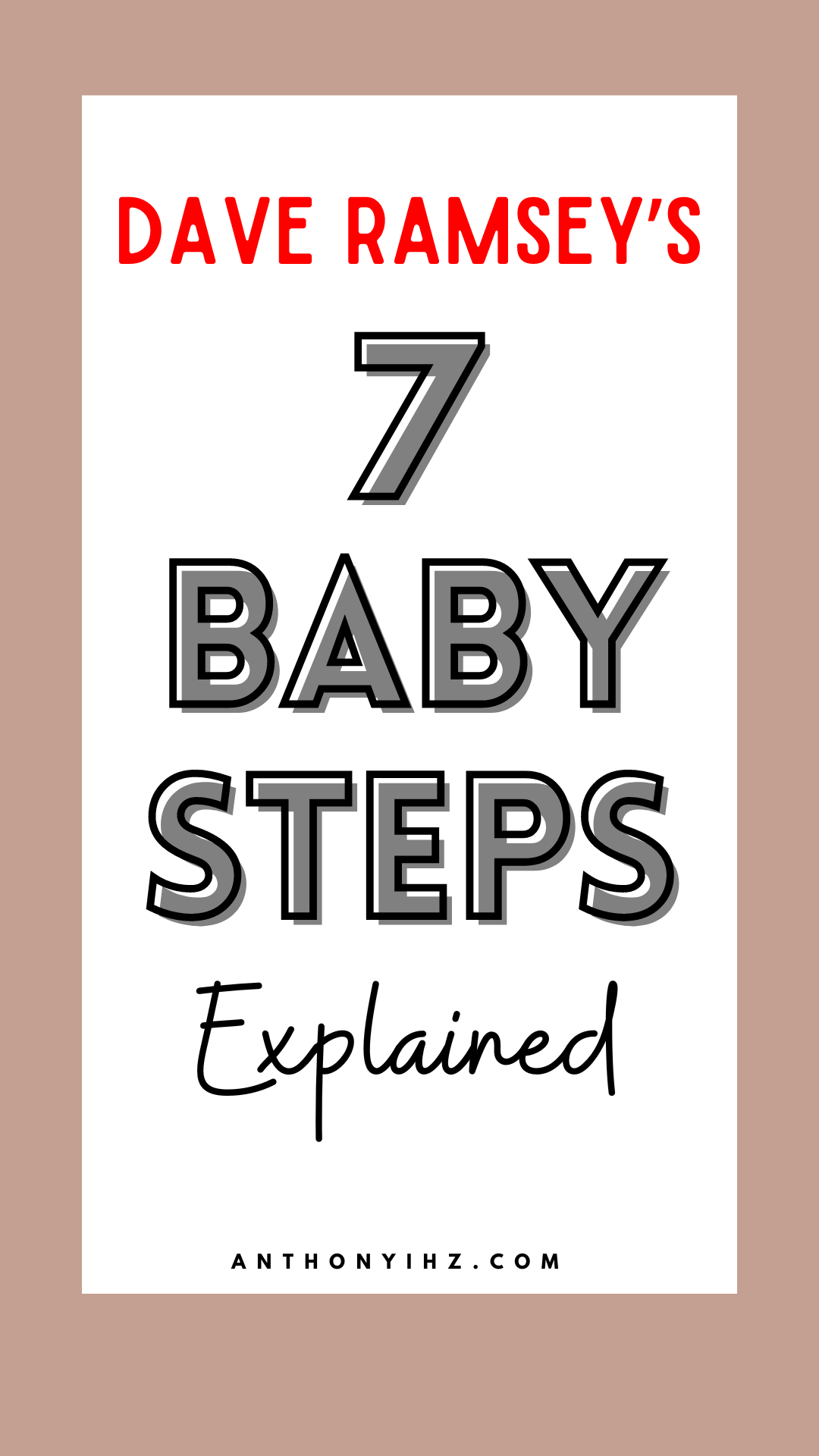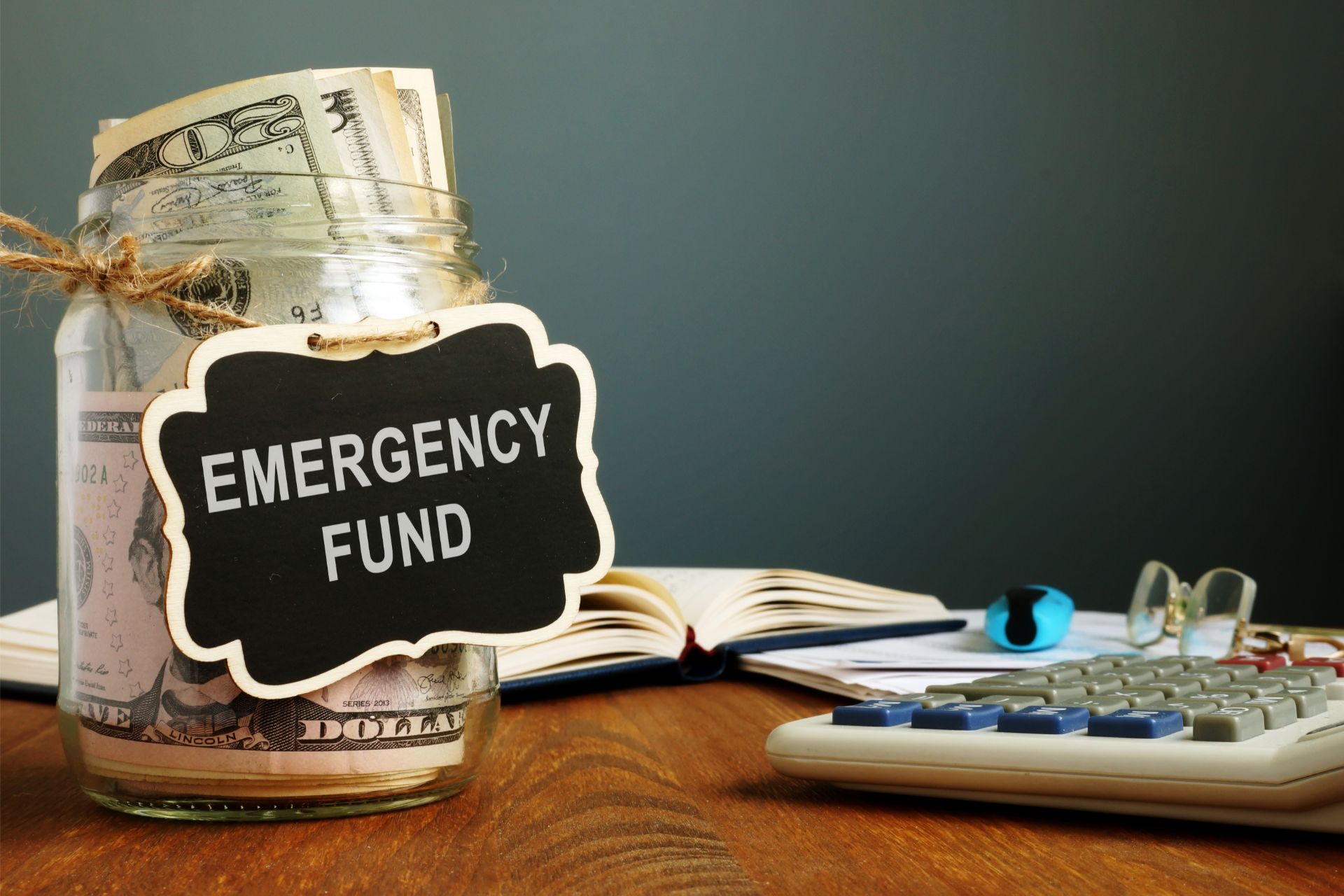
Paying down debt, saving money, and increasing your income are the major areas to work on when it comes to improving your personal finance. This is the perfect place where Dave Ramsey baby steps come in. These steps are an ideal strategic approach to changing your financial situation for the better.
The first time I discovered and applied the steps, I gained clarity immediately. I could obviously see the basic mistakes I made with money—how I mismanaged my income and pursued the wrong goals.
As I introduce you to the Dave Ramsey baby steps and show you how they work, you will understand that it’s not too late to turn your financial situation around. There’s still an opportunity to make a change and protect your future.
I know you can’t wait to learn about these steps. That’s why we are diving in right now!

Dave Ramsey’s 7 Baby Steps Explained
The Dave Ramsey Baby Steps is a 7-step plan that will help you pay off debt faster, reach your savings goals, and ultimately build wealth. It’s a practical approach—you take specific actions and wait to see the impending change you desire.
Besides, employing these steps is probably the best thing you can do when you lack ideas on how to improve your personal finance. This is because the 7 Dave Ramsey baby steps explained in this post will basically point you in the right direction. You’ll gain insight into how to correct all your financial mistakes and make the right decisions moving forward.
On the other hand, this 7-step plan will teach you patience and why it’s important to observe due process. You don’t rush the steps. You execute them one after the other while tracking your progress as well. No one climed to the summit of Mount Everest with a single long jump. It’s one (baby) step at a time.
How To Get Started With The Dave Ramsey 7 Baby Steps
Now let’s see how these steps work and how you can start applying them to get your finances back on track. Here you go:
Baby Step 1: Build An Emergency Fund (Minimum Of $1,000)

During a study, it was discovered that only 32% of Americans can pay cash for a $400 emergency. This means most Americans are unable to sort out emergencies unless they borrow some money or use credit cards. That’s one of the easiest ways to get into debt.
Occasionally, we have to cover unexpected costs. Your washing machine suddenly stops working. Your car breaks down. Your kid gets into an accident at school and needs to be treated ASAP. These things happen. You can’t avoid them. However, you can be financially prepared when they occur.
How do you get prepared? Start saving money in an emergency fund. To raise extra money aside from your salary, try selling some stuff around the house. Cut down costs by using coupons. Plan your meals and avoid dining out. Get your emergency fund up to a thousand dollars as soon as you can. Then you can gradually save more to increase it indefinitely.
Baby Step 2: Pay Off All Debt Using The Debt Snowball

Having debt balances doesn’t help your finances in any way. It holds you back, preventing you from saving enough money or increasing your net worth. Let’s say you now have an emergency fund ready to attack any emergency expenses. Then, we need to focus on paying down your existing debt with the debt snowball strategy.
This debt repayment method works by paying down debt one at a time from the smallest balance to the largest. Don’t forget the tips in step 1 that helped you save money for your emergency fund. Use them to increase your monthly debt payments (while contributing more money towards the least balance).
Besides, if you need comprehensive information about how the debt snowball method works, here’s a post for you. It explains the step-by-step plan to become debt-free with the snowball payoff strategy.
Baby Step 3: Save 3–6 Months Of Expenses In A Fully Funded Emergency Fund

Now you’ve successfully paid off your debt. Well done! It’s time to build a fully funded emergency fund. Remember it was the first thing you started.
Now that you don’t have debt payments eating into your income anymore, you certainly have enough cash to build up the fund. Your emergency fund should be able to cover 3–6 months of your basic expenses. So, that’s the goal you must keep in mind. Save enough money for those future emergency expenses without holding back.
If you aren’t used to a frugal lifestyle, this is the time you fall in love with it. You must find numerous ways to cut down on costs. Develop those money-saving habits and stick to them. Consider this as delayed gratification—sacrificing temporary pleasures for future stability. This is one of the important Dave Ramsey baby steps to execute.
Baby Step 4: Invest 15% Of Your Household Income In Retirement
One of the common misconceptions people have about retirement is that it’s “tomorrow’s problem”. They believe it can wait until later while they focus on other goals that seem more urgent or important.
The truth is that if you don’t start planning for retirement now, you may work for the rest of your life. That’s not something you want for yourself. It’s a pathetic situation. This is why you should consider investing 15% of your gross household income into retirement accounts.
Here’s how you can go about this. Firstly, begin with your employer’s 401(k) (if you have one, of course). Invest up to the match. The next step is to create a Roth IRA and max out your contributions. If after doing this you still haven’t invested 15%, you can contribute the rest to your initial 401(k).
Baby Step 5: Save For Your Children’s College Fund

If you don’t have kids, you can skip baby step 5. But if you do have beautiful kids and want the best for their future, you need to start saving for their education.
Open an Educational Savings Account (ESA) and consistently stash away cash to prepare for your children’s college. If you fail to do this, it means you want your kids to resort to student loans—an avoidable situation if you choose to start planning now.
Moreover, you might be wondering why this step comes after retirement planning. That doesn’t mean it’s less important. But you must remember that retirement is inevitable. You have to stop working someday.
On the other hand, however, your kids may decide to not go to college. In this time and age, people can succeed tremendously without bagging a college degree when they have the right skill sets. Hence, start saving for retirement before you even open an Educational Savings Account for your kids.
Baby Step 6: Pay Off Your Home Early

If you have a mortgage to pay off, you are probably paying over $1,500 every month. After all, the average American spends $1,775 to pay off a mortgage monthly. That’s a lot of money that can be put toward other long-term financial goals. This is why paying off mortgage earlier is a wise decision.
You can make this possible by adding a few extra hundred dollars to your principal payment. You may also need to use a Mortgage Payoff Calculator to determine your progress and see how you can finish the payment faster. This is one of the most important Dave Ramsey baby steps.
Baby Step 7: Build Wealth And Give
This is the final stage of the Dave Ramsey baby steps. Now that you have paid down debt, gained full ownership of your home, and have an emergency fund to fall back to, it’s time to skyrocket your finances and also favor those around you.
At this point, your income isn’t tied up in debt payments or mortgages. You can freely contribute to charity programs in your church or neighborhood. You can be generous to other people who are in need. Being able to extend a hand of help can be so fulfilling.
But as you give, don’t forget you need to increase your net worth significantly. Max out your retirement accounts. Also, find other legit and safe means to invest your money.
Benefits Of Dave Ramsey’s Baby Steps
Observing Dave Ramsey baby steps will change your finances for the better. Here are some reasons why you should get started today:
1. Helps You To Focus On One Goal At A Time
The unique thing about these steps is that they help you achieve all your goals one after the other.
It’s usually very intimidating or scary when chasing several big goals at the same time. You will be too overwhelmed and probably won’t get to the finish line. But when you rely on the 7-step plan as your blueprint, it’s clear that you have to tackle one goal at a time.
This won’t happen quickly, but you’re definitely on a steady journey to reaching your dreams.
2. Helps You Avoid Debt
One of the steps mainly focuses on how to pay off debt. So if you strictly adhere to it, you can actually attain a debt-free life sooner.
Whether it’s a student loan, mortgage, or a huge pile of credit card debt, the debt snowball is a reliable strategy to help you pay off what you owe. Thankfully, that’s the payoff method recommended by Dave Ramsey in his 7 baby steps.
3. Helps You To Know Your Priorities
When trying to improve your finances, it’s important to focus on what matters at a particular time. If you choose to chase the wrong thing because you’re ignorant, you’ll regret it eventually. But with this 7-step plan, you can see how the goals are placed in the right order.
For example, paying off debt comes before investing. That’s how it should be.
4. Helps You Determine Your Progress
Since the goals are arranged in a particular order, it’s easier to tell how well you’re progressing with the 7 Dave Ramsey baby steps.
For example, after setting up your emergency with the first $1,000, you can mark that as a milestone. You’ve obviously moved one step forward. By the time you finish paying off debt, it’s evident that your financial situation is getting much better. That’s how this strategy helps you determine your progress.
Disadvantages Of Dave Ramsey’s Baby Steps
Although this strategy is an amazing way to turn your finances around for the best, here are some things to keep in mind.
1. It’s Not An Instantaneous Process
The Dave Ramsey baby steps are not get-rich-quick schemes or some plans you can execute and get results immediately. It doesn’t happen that way at all. The strategy requires time. You have to be patient. In fact, it would take years for you to complete the entire steps. However, the reward is for a lifetime. There will be no reason to struggle financially if you carry all 7 steps correctly.
2. It Requires Self-Discipline
You can’t execute this 7-step plan if you are going to be lazy. Bear in mind that it’s a hard decision. You have to develop a good level of self-discipline to keep up with each step. This means that even when it gets hard, you must keep going. Even when you aren’t compelled to save money in an emergency fund, you have to do it anyway. You shouldn’t let anything break your spirit.
3. You Need A Reliable Income To Keep Up
Every aspect of the Dave Ramsey baby steps explained here involves spending, saving, or investing money.
You need money to pay off debt. You need money to build an emergency fund. You need money to prepare for retirement and save for your children’s emergency fund. This simply means you need a reliable income stream to support these goals until you achieve them.
If your salary is too small, it’s time you find another job if you are too scared to ask your employer for a raise. You can also start a side hustle to have an additional source of income.
Recap: Dave Ramsey’s Baby Steps
It’s really hard trying to figure out the solution to your financial difficulties. You sometimes get frustrated and you don’t seem to find a way out. But when you have a roadmap that shows you the specific routes to pass, you won’t be lost anymore. That is the purpose the Dave Ramsey baby steps explained in this post serve—your roadmap to financial freedom.
Get to work now and start implementing these steps.
Pin this for later!


